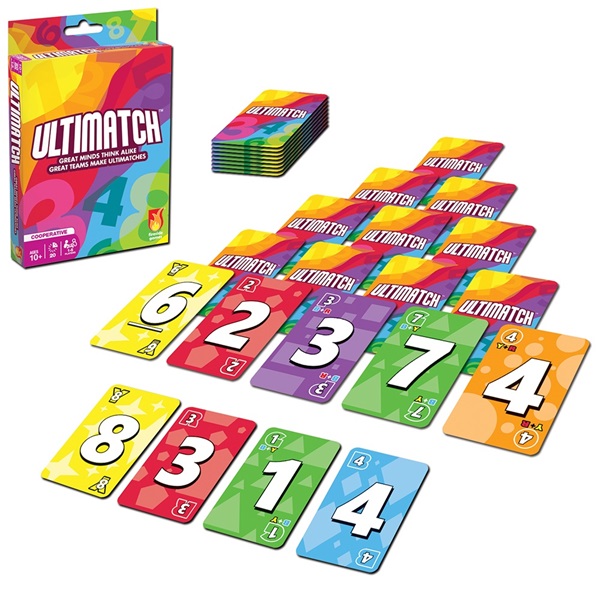Use Silent Strategies and Colorful Matches in Cooperative Card Game Ultimatch

Combine numbers or colors to clear out the pyramid of cards. Match both features to create a powerful ultimatch and be richly rewarded!
Published by Fireside Games, Ultimatch is a cooperative card game for 1-5 players, and has a 20-minute playtime.
Gameplay
Cards in the deck are numbered 1-8 and come in six different colors. Depending on player count, 15 or 21 cards are laid out to form a pyramid, with all the cards face-down except for those in the front row. Each player is dealt a hand of cards and the remaining cards are set aside to form the draw pile. Each player looks at the cards in his hand and then plays one face-up into the alta-hand.
On a player’s turn, he starts with the trading phase. All players look at their hands and see if there is a card they wish to offer the active player. If so, they place them face-down on the table. Players are not allowed to communicate outside of physical communication. A player offering a trade may indicate using facial expressions or body language the strength or nature of his card.
The active player may choose one player offering a trade and give him one of his own cards in exchange. If the active player has no cards, he can simply take a card being offered to him without giving one in return.
Next, the active player attempts to make a match. He may play 1-2 cards between his cards and the alta-hand, to match one of the face-up cards in the pyramid. A match can be the same number or the same color. Or, it can be two cards whose numbers add up or subtract down to the pyramid’s number. It can even be two cards whose colors combine to make the color of the pyramid’s card. If the active player manages to match both color and number (this can be through combining cards as well), then this is an ultimatch. When a player makes an ultimatch, he draws a card into his hand and draws a new card for the alta-hand. Finally, all cards that were part of the match (including the one in the pyramid) are discarded. If this causes a face-down card in the pyramid to be uncovered, it is flipped face-up.
The active player must always make a match if he has a legal one to make. However, if the only way he is able to make a match is by using only cards from the alta-hand, he may choose to pass. If there is no legal match for him to make, then he must pass. When the active player passes, he draws a new card into his hand.
If all players pass one after another, they lose the game. If they manage to match all the cards in the pyramid, they win.

Review
Ultimatch reminded us, in a good way, of games like The Mind or The Game, and we approached it in a similar way. Communication is quite limited. What communication is allowed is a little vague in the rules, but we’ve found that finding the limits of that communication is a group experience. In this type of game, players naturally figure out what works for their group, and what they’re comfortable with. Our communication might have gone a little beyond what was intended in the rulebook, but we enjoyed finding that limit while still keeping within the spirit of the game.
The matches here are quite interesting and the ability to not just add numbers but also colors to create matches and ultimatches, is unique. The game is all about managing your hand and trying not to run through cards too quickly. Players need to make a match if they are able to from their hand, so they need to be careful to manipulate the board as much as possible so that all players aren’t forced to pass on the same round and thereby lose the game.
When you first start playing, it feels so easy — but players quickly realize that as the pyramid shrinks and options become more limited, it’s actually deceptively tricky. This is the type of game players will try multiple times, developing their strategies as a team, inching closer to victory, until finally getting to that moment. It feels great when you finally match that last card in the pyramid.
There’s a lot of clever little design choices here. The alta-hand provides a little open information, which gives players an idea of what trade offers are best to put on the table. The fact that players can trade also gives people something to do when its not their turn as they still have to study the current board state and see if they have a good path to offer help. Finally, the design on the cards is well done, as it helpfully shows which colors can be mixed to achieve a match.
There are one or two details that are a bit vague in the rules, such as the communication issue, but also whether or not players should draw back up to the full hand limit after playing cards into the alta-hand during setup. But these are minor points that can easily be decided by the group.
Ultimatch is light, compact, and portable. It’s a great abstract, cooperative game that’s fun and challenging, and will leave players wanting to keep going ‘one more time’ until they manage that win. The solo mode is also quite enjoyable, and the overall result is a satisfying experience. Recommended!
Pros: Deceptively simple mechanics result in tricky gameplay, challenging, design on the cards to make color matching easier, use of the alta-hand
Cons: A couple of vague moments in the rules
Disclosure: we received a complimentary review copy of this game.







